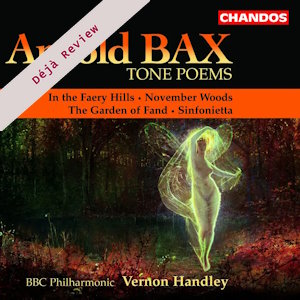
Déjà Review: this review was first published in May 2007 and the recording is still available.
Sir Arnold Bax (1883-1953)
Tone Poems
In the Faery Hills (1909, revised 1921)
November Woods (1917)
The Garden of Fand (1913, orchestrated 1916)
Sinfonietta ‘Symphonic Fantasy’ (1932)
BBC Philharmonic Orchestra/Vernon Handley
rec. 2005, Studio 7, New Broadcasting House, Manchester, UK
Chandos CHAN10362 [76]
Chandos meet the demands of Bax’s saturated colours with a recording that stands in the vivid Decca tradition.
What we have here is two of the classic tone poems: Fand and November Woods with the early and fantastic In the Faery Hills. Coupled this with the mixed triumph and failure of the much later Sinfonietta. The empty seat at the table is Tintagel. It’s not here because this disc is surely intended to work as a supplement to the Handley-Chandos four disc Bax symphony set made with the same forces. That set included Tintagel and the Rogues Comedy Overture as fillers so there was no point in repeating Tintagel. The Sinfonietta has had only one previous recording which was not well received. This is the work’s second chance. As for the other overtures, Lyrita will very soon issue Handley’s long shelved RPO recordings of the Overture: Work-In-Progress, Overture to Adventure and the Rogues Comedy Overture alongside Irish Landscape and crucially Norman Del Mar’s classic and irreplaceable recording of the Sixth Symphony. This will be on SRCD296. The Overture to Adventure was crackingly done by Douglas Bostock – a much later Boult pupil – on ClassicO but in rather bass-starved and treble-shrill sound.
The present collection is generously proportioned and handsomely offered up. The performances are magical and includes in particular a simply splendid version of In the Faery Hills. I recall hearing a superb performance of this work conducted by Ashley Lawrence circa 1979 on BBC Radio 3. This is fully the equal of that broadcast although the starry magic of the piece is outpointed by Lawrence in one aspect. The BBC engineers accorded some agreeably unnatural spotlighting to the final chattering solo viola. The instrument is just that shade more discreet in the Handley and not to its advantage.
November Woods is one of Bax’s ten finest scores – a touchstone. Early on the score needs more urgent propulsion that Handley imparts here. However, from the moment when the gale raises its head (2:37) its potency ‘plies the saplings double’ – even uproots them. The power is unmistakable and Handley conveys a granitic grittiness from 3:38 onwards. Bass drum and deep brass register sinister agencies at murderous play in this score. Handley was a Boult pupil and he is up against Boult’s own Lyrita recording from 1967-8. The Lyrita sports red-blooded Decca engineering. The more naturalistic approach adopted by Chandos in Manchester does not have quite the same impact. Still it’s a sweeping and very grand reading although not displacing Boult’s propulsive urgency.
In The Garden of Fand Handley’s principal competitor is Barbirolli on Dutton. The Boult Fand on Lyrita is nowhere near as good as Boult’s 1960s November Woods. The Barbirolli is from the late 1950s and its maximum impact spotlighting is contrived – glorious but contrived. This Chandos version treads the gorgeous line between true concert hall perspective and giving pleasing prominence to parts of the orchestral weave. Handley knows this fine score so very well. I have a tape of his conducting of the NCOS orchestra in the 1980s and I knew that his Fand would be extraordinary. So it is.
The Sinfonietta is from 1932 when Bax was at his peak. Even so it has always been a Cinderella work. Handley knows the piece, having conducted it in 1983 with the BBC Welsh Symphony Orchestra. That was as part of the BBC’s handsome Bax centenary celebrations. The music communicates much more strongly here and with greater definition of character than in the Marco Polo version – though that is by no means poor. The language is coloured by the fact that Bax had in the 1930s ‘gone Northern’. There are some strongly Sibelian moments as in the first movement chatter at 4:10. The kinship is with Bax’s three Northern Ballads and especially with the first two – the second being intensely dark and minatory. The finale has the necessary gaudy barbarism to bring the house down in a sparking shatter of Brangwyn scintillation.
As they did with the symphonies so Chandos now do with the tone poems. The Bryden Thomson recordings made by Chandos in the 1980s and early 1990s are still in their MP3 catalogue. They run head-to-head with Handley but never in identical couplings. Handley is out-pointed by Thomson only in the Fourth Symphony – all the planets must have been in the right conjunction that day in Belfast for such a magnificent recording and interpretation.
This is an essential acquisition for all Baxians. It also paves the way for the next Handley/BBCPO release which will include the three Northern Ballads in sequence as well as some other shorter works including Red Autumn. The latter work has been freshly orchestrated by that fine and insightful Baxian, Graham Parlett who contributed so generously to my own early exploration of the Bax catalogue in the early 1980s.
Rob Barnett
Buying this recording via a link below generates revenue for MWI and helps us keep free access to the site



















